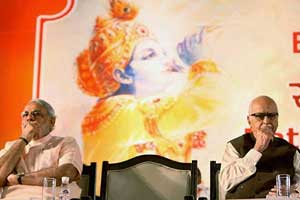 New Delhi, Sep 12: BJP stalwart L K Advani has dug in his heels. He refused to drop his opposition to Narendra Modi as the party's prime ministerial nominee, leaving party president Rajnath Singh with little choice but to push on regardless of the veteran's objections. This will undoubtedly cast a shadow of controversy over Modi's anointment and show up BJP as a divided house.
New Delhi, Sep 12: BJP stalwart L K Advani has dug in his heels. He refused to drop his opposition to Narendra Modi as the party's prime ministerial nominee, leaving party president Rajnath Singh with little choice but to push on regardless of the veteran's objections. This will undoubtedly cast a shadow of controversy over Modi's anointment and show up BJP as a divided house.
The BJP president on Wednesday cited RSS's endorsement of Modi as well as the majority opinion in the party to tell Advani that Modi should be declared the PM candidate without any further delay. But Advani, said sources, remained unmoved. He had earlier objected to Modi as the saffron choice for the top job on the ground that an announcement now would shift the focus from Congress's failures to Modi's controversial persona.
Fresh efforts to bring Advani around are expected to continue on Thursday, although hopes of a breakthrough remain slender. With Advani unlikely to yield, Rajnath looks almost set to call a meeting of the party's parliamentary board on Friday to make the announcement. Although the party constitution empowers the president to make the crucial call after consultation with members of the parliamentary board, Rajnath is likely to call the full house to advertise that the decision has the backing of the majority in the board — that is, eight of 11 members (excluding ailing former PM A B Vajpayee).
Sources said that Rajnath can put off the announcement to Monday only if Advani agrees to be present at the press conference — which at present seems an unlikely prospect.
Sources said that a decision on Modi, even in the face of resistance, will reflect what has been touted as the overwhelming mood of the cadre, but acknowledged that Advani's tenacious opposition may turn the moment into a messy affair. Besides Advani, leader of opposition in Lok Sabha Sushma Swaraj is opposed to the idea of Modi being declared the PM candidate ahead of the state polls set for October-November. Sources expect her to make a strong argument against party engaging in open defiance of Advani's views.
Rajnath also had a meeting with Murli Manohar Joshi, another member of the parliamentary board who argued for the announcement to be put off until after the assembly polls. But Joshi is, sources reckon, not expected to come in the way of the "majority view".
The party president's last-gasp effort to get Advani to relent stemmed from his anxiety to avoid a growing perception that the party is a divided house. However, with sthe quest for unanimity proving to be elusive, the party president is determined to press ahead with his plan for the big announcement before Modi's birthday on September 17. That the inauspicious Hindu period of pitrapaksha — the fortnight when all the important calls are put on hold — starts on September 19 have contributed to the Rajnath's anxiety for a closure on the issue by Monday.
BJP leaders admit Advani's decision to oppose Modi threatens to take some of the sheen off the expected announcement as the party will be seen to be divided at a big moment. This, some feel, may well be the calculation of Modi's detractors.





Comments
Add new comment